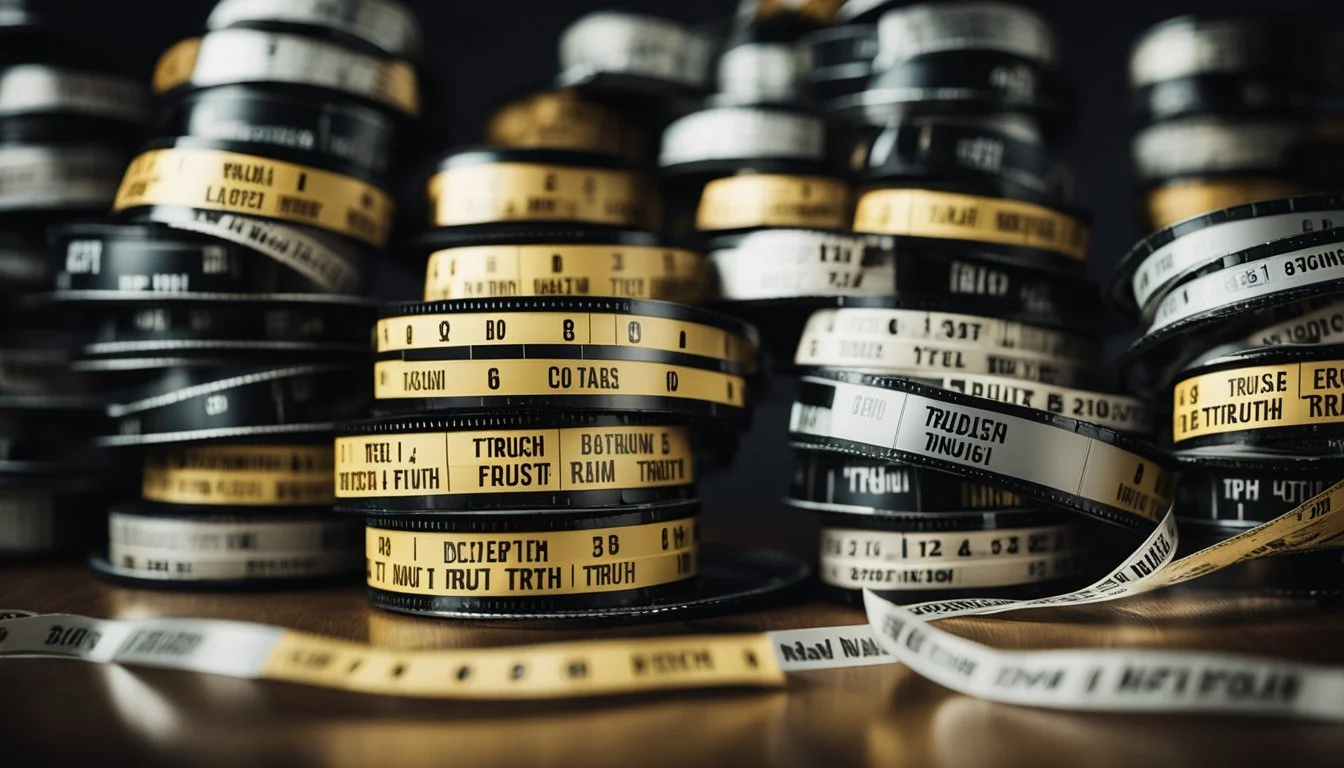9 Stories of Deception
Must-Watch Documentaries Unveiling Hidden Truths
Deception has long captivated audiences, drawing them into stories where truth and lies intertwine. Documentaries that explore these narratives uncover the complexities of human behavior and motivation, offering insight into the art and allure of deception. These films dissect how individuals manipulate situations and people, revealing the underlying factors that drive such deceit.
From high-profile corporate scandals to intricate webs of personal deceit, these stories often illuminate broader societal issues. They provide a lens into worlds where reality and illusion blur, challenging viewers to question their perceptions and understanding. Documentaries serve as a powerful medium to explore these themes, encouraging a deeper reflection on truth and deception.
1) "Thou Shalt Not Kill: A True Crime Investigation" (2006)
"Thou Shalt Not Kill: A True Crime Investigation" delves deeply into the complexities of a notorious murder case. This documentary scrutinizes the evidence and testimonies surrounding the crime, highlighting potential miscarriages of justice that occurred during the investigation and trial.
The film provides a detailed account of the crime's circumstances, featuring interviews with key individuals involved. Attorneys, detectives, and family members of both the victim and the accused share their perspectives. Through these interviews, viewers gain insight into the motives and challenges faced by those seeking the truth.
With a methodical approach, the documentary examines the legal and ethical dilemmas that arise in high-stakes crime cases. This film poses challenging questions about the criminal justice system and its implications for those wrongfully accused.
For more information, visit the IMDb page for "Thou Shalt Not Kill: A True Crime Investigation".
2) "The Imposter" (2012)
"The Imposter" is a gripping documentary that delves into the story of Frederic Bourdin, a French con artist. He managed to convince a Texan family that he was their long-lost son who had disappeared years earlier. The film highlights Bourdin's extraordinary ability to deceive and manipulate those around him.
Directed by Bart Layton, the documentary skillfully constructs a narrative that feels almost fictional in nature. The storytelling is supported by interviews and dramatic reenactments, drawing viewers into the complex web of lies spun by Bourdin. Critics have praised the film for its suspenseful and engaging narrative style.
Released in 2012, "The Imposter" received positive reviews from audiences and critics alike. It holds a high rating on Rotten Tomatoes and was shortlisted for an Oscar nomination in the Best Documentary Feature category. The documentary raises important questions about human perception and belief.
For more detailed information, visit "The Imposter" on IMDb.
3) "Fyre: The Greatest Party That Never Happened" (2019)
This documentary provides an in-depth look at the collapse of the infamous Fyre Festival. Planned as an exclusive music festival in the Bahamas, the event turned into a chaotic disaster.
Produced by Chris Smith, it explores how the festival's organizers promoted a luxurious experience they were unable to deliver. Attendees arrived to find basic tents and inadequate food, creating a public relations nightmare.
Fyre Festival became notorious for its mismanagement and the viral image of a cheese sandwich. The chaos was a result of poor planning and deceitful marketing strategies.
The film distinguishes itself by focusing on the human stories behind the headlines. Interviews with attendees, organizers, and workers reveal the full extent of the breakdown.
Both compelling and disturbing, this documentary highlights the power of social media marketing and the dangers of unchecked ambition. It serves as a cautionary tale of how influencer culture can lead to real-world consequences.
For more information, visit Wikipedia or IMDB.
4) "Dirty Money: The Maple Syrup Heist" (2018)
"Dirty Money: The Maple Syrup Heist" is a notable episode in the "Dirty Money" documentary series on Netflix. This captivating piece directed by Brian McGinn explores an unusual criminal case in Canadian history. The heist revolves around the theft of approximately $20 million worth of maple syrup.
In Quebec, the "Great Canadian Maple Syrup Heist" unfolded between 2011 and 2012. Organized crime syndicates targeted a crucial storage facility owned by the Federation of Quebec Maple Syrup Producers. The stolen syrup was eventually smuggled and sold on the black market.
The documentary sheds light on how such a seemingly unconventional item like maple syrup can hold immense value, surpassing even oil. It dives into the intricacies of the syrup industry and the impact this heist had on both local producers and international trade.
By focusing on the characters and organizational structures involved, viewers gain insight into the complexities of maple syrup production. The film deconstructs the sophistication and scale of this heist while maintaining a focus on its cultural and economic implications.
More information about this episode can be found on IMDb.
5) "Behind the Curve: Flat Earth Exposed" (2018)
"Behind the Curve" captures the culture and beliefs of the Flat Earth movement. The film follows prominent Flat Earthers, offering an inside look at their community and ideas.
The documentary explores the psychological factors driving disbelief in established science. It presents interviews with scientists who explain the resilience of the conspiracy theories despite evidence to the contrary.
The film balances empathy and skepticism, highlighting the personal stories of those involved. It does not seek to ridicule but to understand the persistence of such views.
By showcasing conversations between believers and scientists, it underscores the challenges in bridging these ideological divides. The narrative encourages viewers to consider the broader impacts of misinformation.
The portrayal is both engaging and informative, providing a unique lens on a controversial topic. This exploration reveals not just the debate over planetary shape but also tensions around knowledge and belief.
For more information, visit Wikipedia.
6) "Wild Wild Country" (2018)
"Wild Wild Country" is a compelling docuseries about the rise and fall of a controversial community in Oregon during the 1980s. Directed by Chapman and Maclain Way, it explores the story of Rajneeshpuram, a commune established by followers of the Indian guru Bhagwan Shree Rajneesh.
Set in the small town of Antelope, the series examines how the group clashed with local residents. This resulted in legal battles and widespread media attention. The series provides an in-depth look at the complex dynamics within the movement, featuring notable figures like Ma Anand Sheela.
By incorporating archival footage and interviews, "Wild Wild Country" offers insights into the cultural conflicts and legal issues that arose. It sheds light on themes of religious freedom, immigration, and community. This engrossing narrative invites viewers to reflect on the events' broader implications.
For further information on "Wild Wild Country," check the IMDb page.
7) "Three Identical Strangers" (2018)
"Three Identical Strangers" is a documentary that unravels the incredible story of triplets separated at birth and adopted by different families.
The narrative begins with the serendipitous reunion of the brothers at the age of 19, leading to media attention and public fascination.
As the documentary progresses, it reveals darker undertones behind their separation, stemming from a secret study on nature versus nurture conducted by a New York adoption agency.
The ethical issues surrounding this psychological experiment are a focal point, highlighting the impacts on the triplets' lives and relationships.
The film effectively raises questions about scientific responsibility and the consequences of manipulating lives for research.
Director Tim Wardle provides an engaging and thought-provoking exploration of identity and family.
Further information can be found here.
8) "Tickled: An Investigation" (2016)
"Tickled" begins with New Zealand journalist David Farrier discovering an eccentric online competition — Competitive Endurance Tickling. Initially looking for a light-hearted story, Farrier encounters unexpected hostility when he attempts to reach out to those involved with the tickling videos. This sets the stage for a dark exploration beyond the smiling faces captured on camera.
As Farrier digs deeper, the story reveals a web of deceit and manipulation. Participants of the tickling competition come forward, describing experiences of coercion and intimidation that followed their involvement. The documentary uncovers how legal threats were used to silence those attempting to speak out.
The investigation exposes the bizarre underworld governed by power and control. The enigmatic figure behind the tickling empire remains shrouded in mystery, evoking questions about identity and motives. This documentary merges unusual subject matter with an exploration of power dynamics and secrecy.
For more details, visit IMDb.
(2016)
9) "The Act of Killing" (2012)
"The Act of Killing" is an audacious and innovative documentary directed by Joshua Oppenheimer. It explores the 1965-66 Indonesian mass killings through the perspectives of those who participated in the events. This film stands out for its unique approach by inviting former death squad leaders to reenact their real-life atrocities in any cinematic genres they choose.
The documentary delves into the psyche of the perpetrators, as they recreate their violent acts using surreal and artistic forms. It allows the audience to witness the unsettling mixture of boastfulness and realization demonstrated by the participants, offering a rare glimpse into the impact of propaganda and desensitization.
This experiment in filmmaking prompts these men to confront the gravity of their actions, pushing the boundaries of traditional documentary storytelling. It resists simplifying the narrative, instead presenting the complex layers of truth surrounding the events.
"The Act of Killing" has been recognized for its bold storytelling and its ability to engage viewers in a disturbing yet enlightening dialogue about history and memory. It offers an unvarnished look into a dark chapter in Indonesia's past.
Learn more about "The Act of Killing".
Examining Deception in Media
Media has a significant role in shaping public beliefs, often navigating through a complex web of truths and falsehoods. Understanding the media's influence on public perception and the techniques used to reveal lies can illuminate how narratives are constructed and deconstructed.
Impact on Public Perception
The media can profoundly alter how people view reality, affecting opinions and decisions. When deceptive practices are used, misinformation can spread rapidly, skewing the public's understanding of important issues. This can lead to the formation of biased perceptions, ultimately impacting social norms and behaviors.
For instance, the documentary "Hoaxed" explores how false news can manipulate public perceptions. Interviews with individuals accused of spreading misinformation highlight the procedures used to distort facts and how these practices influence societal beliefs.
Media outlets, driven by various motivations, sometimes prioritize sensationalism over accuracy. This pursuit can result in the dissemination of misleading information, leaving audiences with a distorted view of events. The consequence is a public that struggles to differentiate between genuine news and fabricated stories.
Techniques Used to Uncover Lies
The art of uncovering deception is crucial in revealing truth amidst widespread misinformation. Tools like deception detection and statement analysis help experts sift through narratives, identifying inconsistencies that may suggest falsehoods. These methodologies are useful not only in media investigations but also in everyday situations requiring truth verification.
Documentaries such as "The Art of Deception" illustrate how media can act as a puppet for hidden agendas. By identifying discrepancies in storytelling, experts are able to challenge misleading narratives and present a more accurate picture. Audiences are encouraged to develop critical thinking skills, fostering an environment where truth is discerned through careful evaluation and analysis.
The Role of Documentaries in Revealing Lies
Documentaries play a crucial role in uncovering deception and presenting the truth. Through visual storytelling, they offer unique insights into falsehoods, while maintaining an ethical balance to present factual narratives.
The Power of Visual Storytelling
Visual storytelling leverages imagery, sound, and narrative to create compelling experiences that resonate with viewers. Documentaries like "(Dis)Honesty: The Truth About Lies" illustrate how visual narratives capture the nuances of deception, making complex ideas accessible. By showcasing real-life scenarios and interviews, filmmakers can elucidate the emotional and psychological dimensions of lying.
Moreover, the authenticity of visual storytelling helps bridge the gap between the subject and audience. This method not only informs but also engages, prompting critical reflection on the nature and impact of dishonesty. By utilizing dramatic reenactments and expert commentary, documentaries effectively demystify intricate plots.
Ethics in Documentary Filmmaking
Ethics in documentary filmmaking is fundamental when revealing lies, as filmmakers must uphold integrity and accuracy. Erin Lee Carr's work highlights the responsibility to depict scenarios factually while respecting the individuals portrayed. This commitment ensures that documentaries act as trusted sources of information, navigating the ethical dilemmas surrounding privacy and consent.
Documentaries face challenges in balancing entertainment with truthfulness. They must avoid sensationalism that could distort reality or harm subjects. Adhering to ethical standards allows filmmakers to provide insightful revelations while maintaining the audience's trust. Filmmakers often consult with ethicists and legal advisors to navigate these challenges carefully.






